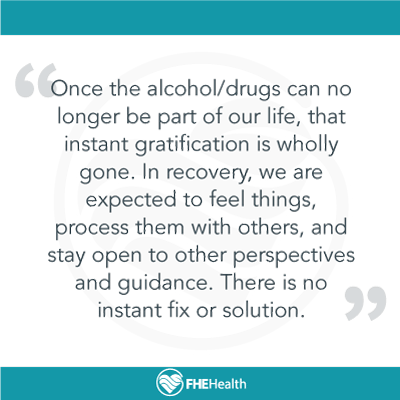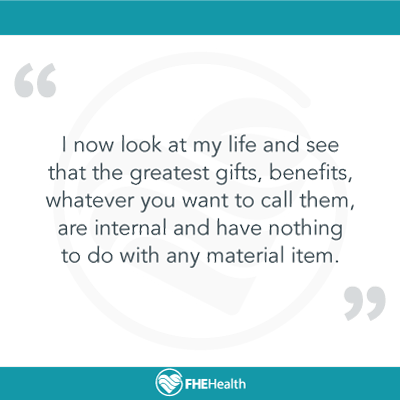
Many things are hard about recovery; I could write a list of 50 different angles on what makes recovery a tough thing to conquer. One of those top reasons would be that it takes time to reap the benefits truly.
The phrase ‘it takes time’ is something those suffering from addiction do not sit well with. In general, the addict/alcoholic is very used to instant gratification. If something is not going our way and we don’t like the emotional response, we can go to a substance and make that feeling go away at the snap of a finger.
We become conditioned to it; it is the root of our substance abuse. The beginning of the Big Book states, in the Doctor’s Opinion, that “Men and women essentially like the effect produced by alcohol.” It really is that simple.
 Once the alcohol/drugs can no longer be part of our lives, that instant gratification is wholly gone. In recovery, we are expected to feel things, process them with others, and stay open to other perspectives and guidance. There is no instant fix or solution.
Once the alcohol/drugs can no longer be part of our lives, that instant gratification is wholly gone. In recovery, we are expected to feel things, process them with others, and stay open to other perspectives and guidance. There is no instant fix or solution.
While I was in treatment and finally took it seriously (it took me a few to take it seriously, unfortunately), I became excited about some things like waking up without craving anything, having a second chance at life (or fifth), and being able to enjoy the moment.
Looking back on it, the gifts I am most grateful for in recovery now I could not even conceive when I was still in early recovery. I thought I knew what would make me happy while in treatment, but I realized that I had no idea what would make me happy and hadn’t for a long time.
I thought the right job, salary, and partner would make me happy, and now that I was genuinely giving recovery a shot, I would have access to all those things. I now look at my life and see that the greatest gifts, benefits, whatever you want to call them, are internal and have nothing to do with any material item.
Here are some of the actual benefits of recovery that come little by slowly.
Integrity
Above all else, living with integrity is the essential thing in my life and what I believe is what keeps me fulfilled and happy over anything else.
Integrity is not only living honestly; it’s being a person of your word and sticking to morals and principles at all times rather than giving into self-seeking motives when the opportunity presents itself.
I was a fantastic liar in my addiction; I say that with zero pride; I cringe when I think of some of the schemes and lies I would live. I thought it would be impossible to live entirely honestly in early recovery. Dishonesty seemed like something I was addicted to; I would lie without even thinking about it.
I found that my honesty started with me being completely transparent with at least one person. I needed to have one person in my life to who I could tell anything about my life; of course, I found a person I respected and who I wanted to model myself after. I made them my sponsor.
Through step work, daily reprieve, and primarily through being honest with at least my sponsor about when I screwed up or did something dumb, I began to form a clear picture of the standard I should hold myself to.
Whether people were surrounding me or not, a soul could see what I was doing, there was a certain way I believed I should live, and it should be that way 24/7.
There is a pride and humility I can carry with myself daily that is impossible to explain, but it is the best feeling in the world. It is only a result of the trials and tribulations I have survived through the years due to my integrity. It does not happen overnight.
Becoming A Part Of
 If I were to list the most significant gifts of recovery in order, the top one without a doubt would be becoming a part of my family again. I’ve become someone who can be counted on at any time, and I lean on my mom and brother the same amount as they lean on me.
If I were to list the most significant gifts of recovery in order, the top one without a doubt would be becoming a part of my family again. I’ve become someone who can be counted on at any time, and I lean on my mom and brother the same amount as they lean on me.
I was the lone person at extended family gatherings who was always absent for many years. I look back and think about how my mom must have felt like going to these things and seeing everyone but me there. I can’t fathom what it must be like to be a parent of someone in addiction.
My mom is the strongest person I know and the most important person in my life. I would not be around if it were not for her. I tortured her in my addiction; I’ll just put it that way. Anyone in recovery knows what we can do to our helpless parents who unconditionally love us.
The past few years have been difficult for my mom; thankfully, she has reached out and leaned on me whenever she needs me. I always make it clear to her that she can call me 15 times a day, 24/7, and I mean it with all my heart; heck, I tear up just writing this.
I’d do anything for her and thank God, I know I have helped her tremendously these past few years. It’s the least I can do for her.
None of these things developed overnight. As I mentioned, I was highly dishonest in my addiction. Even when I was well into my recovery, my mother would have triggers from our past
that would still trouble her and scare her.
It was up to me to accept and understand that. Who could blame her for naturally reacting fearfully to a spontaneous call when I was two years sober?
With time though, our relationship has turned into everything I ever wanted it to be.
We all have different circumstances and people that we have burnt the most from our addiction. Naturally, in early recovery, all we want is to heal those relationships and make amends for what we have done.
Amends are a crucial part of the steps, but what amends when it comes to the 9th step?
I was always told the right way to make amends with another person is to own up to what you did and promise never to repeat the behavior. It’s not saying sorry. It’s saying, ‘Here is what I did and I vow I will never do anything like this again.’ This was followed by asking, ‘Was there anything I left out?’
That means there is action after making the initial amends. The step is in how you carry yourself and change yourself. Sticking to it requires brutal honesty with yourself and humility when you come up short, and a character defect pops up.
Living up to those amends is what completely transforms someone over time. It brings us to where we aspire to be. Every person in early recovery has aspirations for who they want to become. Sadly, too often, those aspirations are never met. Fortunately, it is up to the individual and the consistent actions if they genuinely want to follow their aspirations.
Walking The Journey
Recovery is a journey and not a destination. There is no finish line; there is just continued growth and adapting to life until God calls us home. There are many gifts/firsts early on in recovery, but the most incredible gifts come with time and dedication.
I realized in early recovery this time that I had no idea what made me happy. I always thought I did, and it turns out I was always wrong. Once I surrendered to God as I understood him/her/it/whatever, I began seeking what makes me happy and truly being open to everything.
The path of long-term recovery has a lot of ups and downs, twists and turns, triumphs, and failures. When things are not going my way, walking through it is when I have grown the most and received the true gifts sobriety has to offer.
Dr. Bob summed things up when he simply said the ‘cure’ to alcoholism/addiction is:
- Trust God
- Clean House
- Help others
Everything else, he said, is a bonus. Do what you need to experience that bonus part.






